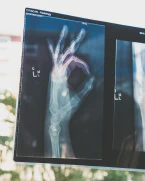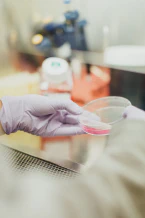Transforming Malaria Control: Innovative Solutions for Mosquitoes

Why mosquitoes are attracted to certain people
We’ve all been there: trying to sleep while being bothered by that annoying buzzing sound of a mosquito flying around. Have you ever wondered why some people get bitten more than others? It turns out, the answer lies in the smell of our bodies.
Our bodies produce chemicals on our skin that either attract or repel mosquitoes. Some people are just naturally more attractive to mosquitoes than others. This is why my friend, who has a sweet smell, always gets bitten more than I do.
As I learned, African malaria mosquitoes are particularly dangerous, as they carry a killer disease that affects millions of people each year. This inspired me to conduct my own research on what chemicals mosquitoes use to track us down at night.
It wasn’t an easy task to figure out, as we produce hundreds of different chemicals on our skin. But we conducted some fascinating experiments that allowed us to solve the puzzle.
First, we discovered that not all mosquito species bite on the same part of the body. For instance, the Dutch malaria mosquito had a strong preference for biting on the face, while the African malaria mosquito had a preference for ankles and feet. This led us to focus on the smell of feet, and we discovered a remarkable statement in the literature that cheese smells after feet more than the reverse.
With that information, we tried using a tiny piece of Limburger cheese, which smells badly after feet, to attract African malaria mosquitoes. And it worked! In fact, we now have a synthetic mixture of the aroma of Limburger cheese that we’re using in Tanzania, which has been shown to be two to three times more attractive to mosquitoes than humans.
It’s amazing what we can learn from mosquitoes and their attraction to certain scents. By understanding the science behind why mosquitoes bite us, we can take steps to protect ourselves and prevent the spread of diseases like malaria.
The Impact of Malaria on the World
Malaria is a disease that affects millions of people worldwide, with half of the world’s population at risk of contracting this deadly disease. Every 30 seconds, a child dies from malaria, and in Africa, the equivalent of seven jumbo 747s crashes every day due to malaria.
It’s a startling reality, and it’s why scientists like me are working tirelessly to find solutions to this global health crisis. The impact of malaria on the world is enormous, with significant economic and social consequences. Malaria affects productivity, health care costs, and tourism, all of which can take a severe toll on the economy of a country.
But malaria doesn’t just affect the economy. It has a significant impact on people’s lives, causing illness, disability, and even death. Pregnant women and children under five are especially vulnerable to the disease, with pregnant women at risk of miscarriage or stillbirth and children at risk of severe anemia, which can cause long-term cognitive damage.
That’s why it’s critical to continue researching and developing new ways to prevent and treat malaria. With advancements in science and technology, we’re now able to detect malaria earlier and provide more effective treatments. But we must also focus on preventative measures, such as mosquito control and vaccination programs.
Through collaborative efforts between governments, researchers, and organizations, we can make a significant impact in reducing the global burden of malaria. By working together, we can create a world where malaria is no longer a threat to human health and wellbeing.
Using Cheese to Attract Mosquitoes
Did you know that mosquitoes are attracted to certain scents produced by our bodies? As it turns out, the smell of Limburger cheese is one of those scents. Yes, you read that right - cheese!
Researchers have found that mosquitoes are more attracted to the scent of Limburger cheese, which smells like feet, than to the scent of humans. This discovery led scientists to experiment with using Limburger cheese to attract African malaria mosquitoes, which carry a deadly disease.
Remarkably, the experiment was a success. Researchers were able to create a synthetic mixture of the aroma of Limburger cheese, which has been shown to be two to three times more attractive to mosquitoes than humans. By using this synthetic mixture, researchers have been able to trap and kill mosquitoes, ultimately helping to prevent the spread of malaria.
It’s amazing to think that something as simple as Limburger cheese could have such a significant impact on the fight against malaria. And it’s a testament to the ingenuity and creativity of scientists who are constantly searching for new and innovative ways to tackle global health challenges.
While it may seem unconventional, using Limburger cheese to attract mosquitoes is just one example of how science can think outside the box to find solutions to complex problems. Who knows what other unconventional solutions researchers will discover in the future?
Using Dogs to Find Mosquito Breeding Sites
Did you know that dogs can be trained to help fight malaria? One of the best ways to prevent the spread of malaria is to kill mosquitoes while they’re still in the water as larvae. However, finding all the breeding sites scattered throughout an area can be a daunting task for inspectors.
That’s where dogs come in. Just like humans, mosquito larvae have a unique smell that can be detected by dogs. By collecting the smell of these larvae and putting it on pieces of cloth, researchers were able to train dogs to sniff out mosquito breeding sites in the field.
Incredible as it may seem, using dogs as inspectors to find mosquito breeding sites has been incredibly successful. The combination of human and canine expertise has led to a much bigger impact on malaria prevention than using inspectors alone.
What’s even more remarkable is that researchers believe dogs can be trained to detect people carrying the malaria parasite. By identifying infected individuals, we can provide them with antimalarial drugs and eliminate malaria as a disease once and for all.
Dogs truly are man’s best friend, and their ability to help prevent the spread of malaria is just one more reason to appreciate these incredible animals. It’s amazing to see how science is using creative and unconventional approaches to tackle global health challenges, and we can’t wait to see what other innovative solutions will be discovered in the future.
Training Dogs to Detect People Carrying Malaria
It’s incredible to think that dogs, our furry companions, can be trained to detect people carrying the malaria parasite. Researchers have found that people carrying the parasite have a distinct smell that can be picked up by dogs, just like mosquito larvae.
This breakthrough discovery could be a game-changer in the fight against malaria. Imagine being able to identify infected individuals in a population and providing them with antimalarial drugs before the disease spreads. This could be the final blow to malaria, leading to its complete elimination.
Ellen van der Zweep, one of the best dog trainers in the world, believes that we can do a lot more with our four-legged friends. By training dogs to detect the smell of malaria parasites, we can target and treat infected individuals more effectively. This approach could have a significant impact, especially in areas where malaria has been largely eliminated, but a few remaining infected individuals continue to spread the disease.
It’s amazing to see how dogs, with their incredible sense of smell, are being used to help tackle global health challenges. By combining the power of science and technology with the intuition of our furry friends, we can make a significant difference in the world. We can’t wait to see what other groundbreaking discoveries are on the horizon, and how they will shape the future of global health.
The Ultimate Revenge Against Mosquitoes
Have you ever wished to take revenge on mosquitoes for their annoying buzzing and itchy bites? Well, scientists may have found the ultimate solution.
During his PhD research, a scientist investigated the chemicals that attract mosquitoes to humans, and he discovered that certain compounds in our skin are more appealing to these insects than others. But what if we could use this knowledge against mosquitoes instead of being their prey?
The scientist found a way to lure mosquitoes using a synthetic mixture that smells like Limburger cheese. In Tanzania, this cheese-like aroma has been proven to be two to three times more attractive to mosquitoes than human scent, making it an effective tool in the fight against malaria.
But that’s not all. Another innovative idea involves training dogs to detect people infected with malaria. Dogs have an incredible sense of smell, and scientists believe they can be trained to recognize the unique odor of malaria parasites. This could be a game-changer in the fight against malaria, especially in areas where the disease has been almost eradicated, and only a few infected people remain.
Finally, the scientist demonstrated a tablet that can kill mosquitoes after they bite. Imagine the power of this tablet during a mosquito-borne disease outbreak. It could help contain the spread of the disease and even eliminate it altogether in large areas if everyone took the tablet for three weeks.
With these groundbreaking ideas, we may have found the ultimate revenge against mosquitoes. It’s time to turn the tables on these bloodsuckers and use our knowledge to protect ourselves from their harmful effects.
A pill that kills mosquitoes
Mosquitoes are known to be carriers of deadly diseases, such as malaria and dengue fever, causing millions of deaths each year. While various methods of mosquito control have been developed, they are often ineffective or pose risks to the environment and human health. However, a recent development in the fight against mosquitoes involves a pill that can kill these pests.
The idea behind this innovative solution is to use a bacterium called Bacillus thuringiensis israelensis (Bti), which is harmless to humans but toxic to mosquito larvae. When the larvae consume the Bti, it disrupts their digestive system and causes them to die. The pill containing Bti can be placed in stagnant water sources where mosquitoes breed, such as pools, ponds, and other bodies of water, and can effectively kill off mosquito larvae in the area.
One of the advantages of this method is that it is both safe and environmentally friendly. The pill targets only mosquito larvae, leaving other aquatic life unharmed, and does not affect other animals or humans. Moreover, it is easy to use and requires no special equipment or training.
While the pill is still in its early stages of development, it shows great promise in the fight against mosquitoes and the diseases they carry. With continued research and development, this pill could be an effective and sustainable solution to mosquito control in the future.
The Potential for Eliminating Malaria with Out-of-the-Box Science
Malaria is a life-threatening disease caused by parasites transmitted to humans through the bites of infected mosquitoes. It is a major public health problem that has affected millions of people worldwide, particularly in sub-Saharan Africa.
In the video, the speaker discusses the potential for eliminating malaria using out-of-the-box science. This approach involves using innovative methods to combat the spread of the disease.
One such method is the use of gene editing technology to modify mosquitoes so that they cannot transmit the malaria parasite. This method involves introducing a gene that makes the mosquito resistant to the parasite, effectively stopping the spread of the disease.
Another out-of-the-box solution is the use of a fungus called Metarhizium to kill mosquitoes. This fungus can be applied to mosquito breeding sites, where it infects and kills the larvae before they can develop into adult mosquitoes.
In addition, the speaker discusses the potential use of drones to release sterilized male mosquitoes into the environment. These mosquitoes would mate with female mosquitoes, but their offspring would be unable to survive, reducing the overall mosquito population and the spread of malaria.
Overall, the potential for eliminating malaria using out-of-the-box science is promising. By continuing to innovate and explore new solutions, we can work towards eradicating this deadly disease and improving the health and well-being of people around the world.
Conclusion
In conclusion, malaria remains a major global health issue that affects millions of people every year. However, innovative and out-of-the-box solutions are being developed to tackle this problem, ranging from using dogs to detect mosquito breeding sites and people carrying malaria to developing pills that kill mosquitoes. Scientists are constantly researching and experimenting with new ways to combat the spread of malaria, and the potential for eliminating this disease is promising.
While progress has been made, there is still much work to be done in the fight against malaria. It is important to continue supporting and investing in research and development of new technologies and methods to combat this disease, as well as educating communities and promoting preventative measures.
By working together, we can make progress towards a malaria-free world and improve the health and well-being of millions of people around the globe.














